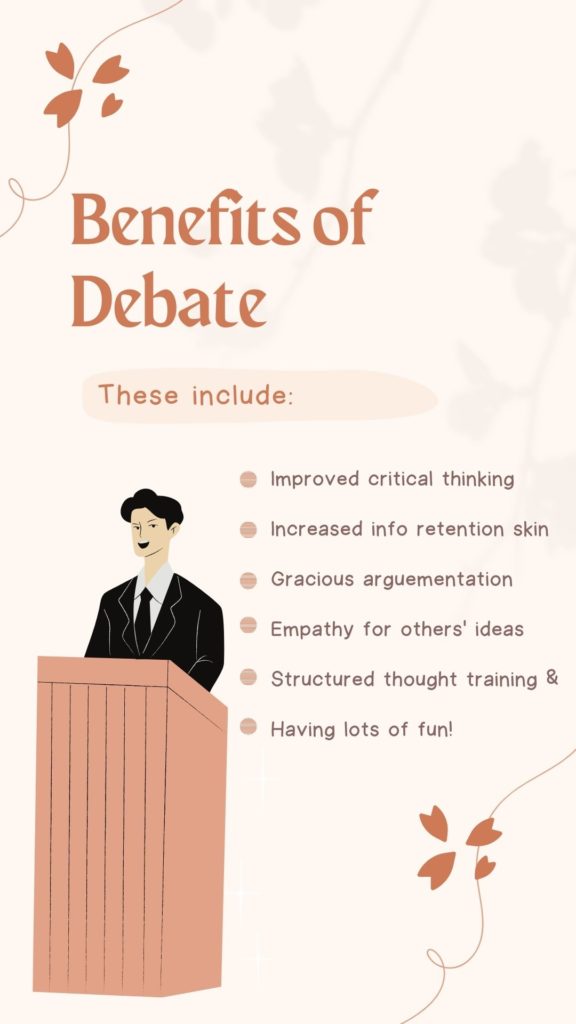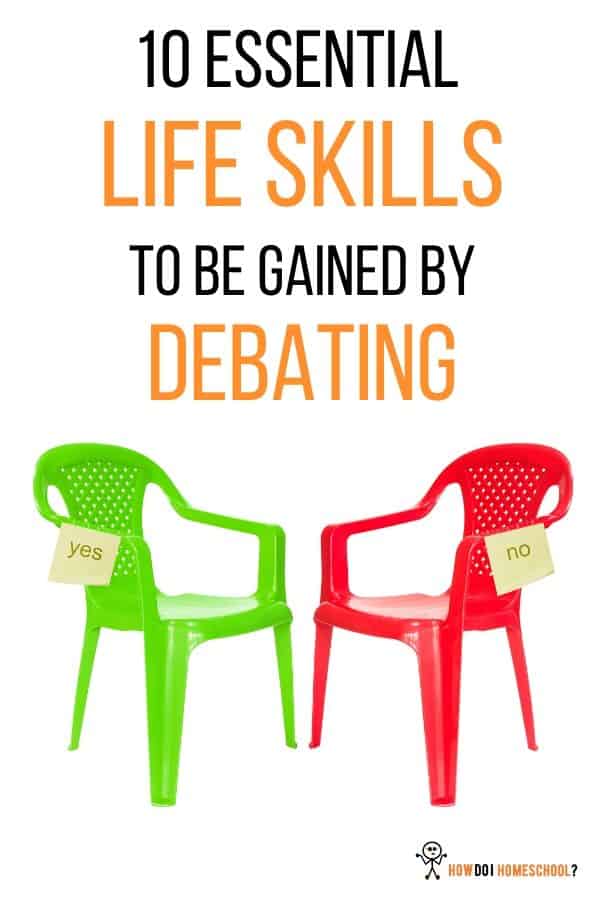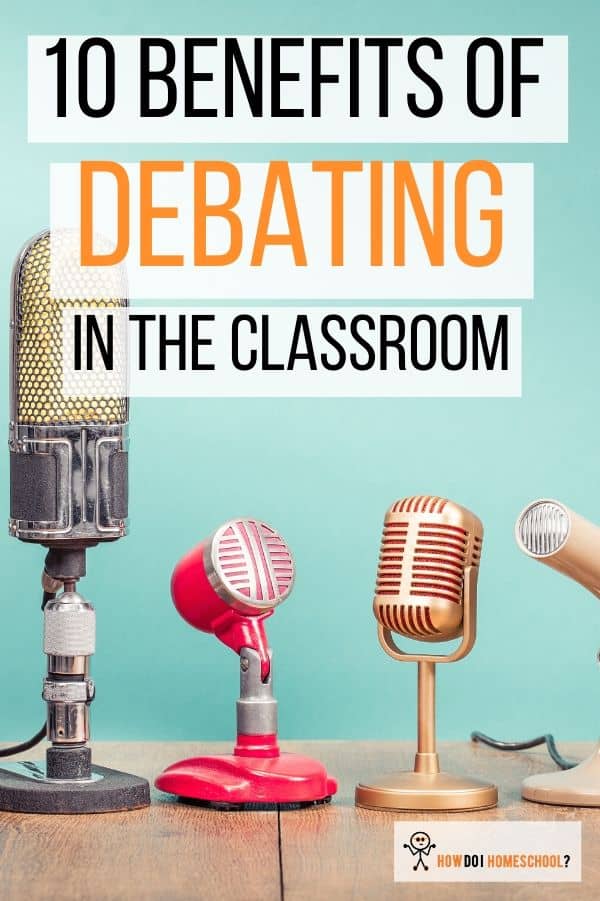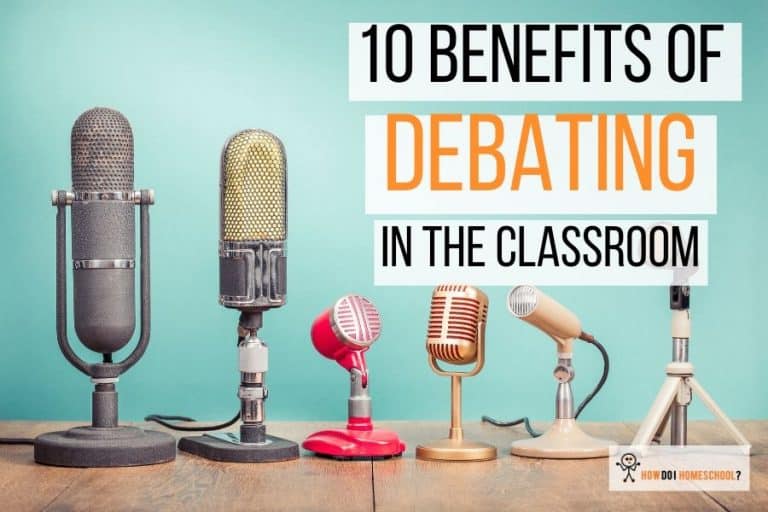Parents curious about Classical education often ask about the benefits of debating and why so many high schools today allow students to battle it out in some capacity. Today, we’ll be exploring the merits of political debate and discussing the fun students will have by participating in it!

I hope you enjoy reading this blog post. If you want to do my course on how to homeschool, click here.
Specifically, we’ll look at:
- The Benefits of Debating
- What is Debating
- The Purpose of Debating
- The Benefits of Debating in Detail and
- Tips and Techniques to Help Debate
Let’s get started!
What are the Benefits of Debating?
The benefits of debating are as follows:
- Improved critical thinking skills
- Pupils acquire better poise, speech delivery, and public speaking skills
- Increased student retention of information learned
- Improved listening note-taking skills and increased self-confidence
- Enhanced teamwork skills and collaboration
- More confidence to stand up for the truth when a discussion is promoting falsehoods or inaccuracies
- Learning better ways to state one’s point with gentleness graciously
- Helping students identify holes in their theories and concocting more balanced arguments
- Helping students better structure their thoughts
- Debating is lots of fun!
Before we look at these benefits in more detail, let’s look at what debating is, the purpose of debating and why debating is helpful to practice.
What is Debating?
Debating means ‘to fight’. Today, debating implies a discussion between two parties to form a conclusion. This skill involves two parties (usually) holding different views about the same topic.
An example of debating is when you have one person who believes in God while another does not. They might be debating a topic on, ‘Does God Exist’. One person will argue God exists, while the other argues God doesn’t exist.
The ‘winner’ of the debate will be the person who has the most compelling argument as to whether God does or does not exist.
But I Disagree With That Debating Topic…
Sometimes people are given topics they disagree with. When I was at college, we were given the slip of paper with the debate question. We were then told to debate the positive or negative side of that view. This created an interesting debate when I was asked to argue for abortion even though I am vehemently against abortion.
This exercise was great for helping me think like a person who supports abortion thinks. It gave me empathy for those who have an abortion and strengthened my case against abortion as I could learn arguments that I would use later.
For homeschoolers, debating varying topics helps broaden their worldview and understand the perspectives of others – especially as many people think homeschoolers have a narrow worldview.
What is the Purpose of Debating
The purpose of debating is to succinctly express yourself clearly to those around you, using persuasive arguments. It aims to help you refine and hone your ideas to be more acceptable to those listening.
It also aims to pick holes in your theories and point out your inconsistencies, so you eventually develop a more well-rounded argument that is persuasive to listeners.
Improved critical thinking skills
The importance of debate in education centres around its ability to teach children critical thinking. In a world where children are spoon-fed information passively, critical thinking is lacking as learning is no longer interest-based.
However, debating can sharpen a student’s critical thinking skills and let them examine the topic they’ve been given. Instead of passively accepting information, they’re forced to hone their thoughts, discard concepts and theories that don’t make sense and adopt ones that do.
Debating also helps them question their beliefs and justify why they think a certain way.
Acquire better poise, speech delivery, and public speaking skills
When debating, you learn to have confidence in what you’re saying as you’ve prepared well for your topic and know it. As such, you learn to hold yourself well with poise.
After you’ve debated for a while, you also learn to deliver your speech confidently and in a persuasive manner.
Having better poise and speech delivery means your public speaking skills will significantly improve. This is because lousy public speaking is often largely a result of poor topic preparation and practice.
Poor preparation and training also mean you will be more likely to get nervous as you’re more likely to fail because you’re not prepared. It’s a vicious circle.
Increased student retention of information learned

Compared to traditional education, debating can increase information retention of the topics studied. This is because debating is active, interest-based learning that engages the mind thoroughly.
Subjects that make students learn actively tend to increase information retention. Therefore, debating helps students remember what they’ve learned longer than passive learning or rote learning.
Improved listening and note-taking skills
One of the other benefits of debating is that it improves students’ note-taking while listening to others. When students start, they can struggle to take notes effectively and discern the main points.
When you’re new to debating, you might start by trying to frantically write down large portions of what the opponent is saying. Then you lose track of the main argument.
However, if you’ve been debating for a while, you’ll know to try to listen for the main points and think about how you’re going to defend those points more generally. This teaches you to sift information simultaneously as you listen to your opponent.
In essence, debating improves your listening and note-taking skills.
Increased self-confidence
As previously mentioned, knowing your topic helps you have more confidence when you’re talking about a subject.
If you know what you’re talking about and you’re confident you have your topic well-in-hand, your self-confidence will naturally increase.
This can be helpful for adolescents who might struggle with self-esteem in their high school years (and one reason classical educators promote debating in middle and high school years).
In the video further down this page, one of the students said he suffered from social anxiety. However, since debating, a lot of this had disappeared entirely.
Enhance teamwork skills and collaboration
You can see the importance of debate in education when you see how much debaters have to collaborate to make a debate go well naturally.
Collaboration isn’t dull when you’re debating. Instead, it’s a lot of fun, and when you’re in a team, you feel like you ‘have each other’s back’ in an argument as you’re on the same team as them. This can lead to great team bonding and fun collaboration work.
More confidence to stand up for the truth when a discussion is promoting falsehoods or inaccuracies
The importance of debate in education comes into its own when you step into the real world.
If you’ve studied many controversial topics in detail, you can confidently stand up for the truth when pushed. For me, this is the most crucial benefit of debating.
I want to teach my children to graciously but unwaveringly stand up for the truth when a discussion in their workplace or family/friend life promotes falsehoods or inaccuracies.
I want them to gently suggest the falsehood or inaccuracy is untrue and then to indicate the truth of the matter and the evidence they have to support the view they are holding.
Unfortunately, many Christians don’t know their Bible, and they don’t know how to stand up for what they believe (1 Peter 3:15), even though the Bible offers many answers. Children who learn to debate, on the other hand, can quickly learn to defend their beliefs in a winsome manner. When the truth is on your side, a defence is easy.
Learning better ways to state one’s point with gentleness graciously
If taught well (and this is the caveat of this point being true), students can learn to express their point in a winsome manner intended to ‘win’ the argument and persuade the hearer.
This will mean judging whether it is the right time to state specific information or wait until the recipient is more open to hearing the news. In this way, debating is also about reading the emotions on the other person’s face.
When it comes to telling others about Jesus, discernment is the name of the game. Those who have verbal diarrhoea in this department will soon find they meet vacant stares or (even worse) increasingly hostile countenances.
The wise debater is the one who assesses the countenance of his opponent and argues gently accordingly.
It’s wise to do this as we see in Proverbs 15:
A soft answer turns away wrath:
but grievous words stir up anger.The tongue of the wise uses knowledge aright:
but the mouth of fools pours out foolishness. (Prov 15: 1-2 KJV)
This may not be the purpose of debate competition, but it’s where the rubber hits the road, and it’s where debate can be used practically in life.
Help students identify holes in their theories and concoct more balanced arguments.
The role of debating is to help us identify bad arguments and refine good ideas.
When we start arguing, we might believe we have a balanced view without holes. However, putting our theories on the table to be poked and prodded makes them prove whether they can hold water.
When our theories are tested and found wanting in certain areas, it forces us to refine our arguments and make them more balanced and easily understandable. This is an excellent benefit of debating that students experience as they actively learn through trial and error.

Help students better structure their thoughts
We can also see the importance of debate in education when we see how much it helps students structure their thoughts from the bits and pieces they’ve learned throughout their lives to a more compelling argument as they’re forced to look up new information.
In many cases, students structure their thoughts proficiently by finding one or more reasons for their beliefs. They then test that belief as their opponent stands up and tries to make mincemeat of their argument.
This then forces them to structure their theories further to have rebuttals for the questions and objections in the first round of debate.
All up, new debating students learn to develop a well-rounded viewpoint. Experienced debaters learn to start their arguments already anticipating their opponent’s objections.
This makes for an intelligent debate that is lots of fun…which leads me to my last point!
Oh, and Debating is Lots of Fun!
The best thing about debating is that it is plenty of fun! In the video further up this page, one of the students remarked that debating had made school a lot more fun. I felt the same way about my debate team in college!
I loved debating at college – indeed, debating night was one of my favorite nights of the week! It was a great way to connect with other students and bond with them, especially if they were on the same team as you!
You also get an incredible thrill when you’ve done your best on a debate, and you’ve succinctly made points (so it doesn’t even matter if you don’t win – so long as you’ve tried, it will be fun.)
Debating Tips and Techniques
In our article, 10 Debating Tips and Techniques: Discover Classical Debating Skills, we discuss the following debate tactics:
- Preparing your debate topic
- Staying on topic
- Speaking slowly, clearly, and charismatically
- Being confident with your topic
- Think about your body language and what it’s telling your audience
- Listening and taking good notes
- Anticipating your opponent’s questions before they’re spoken
- Telling a story or giving an illustration with an example to make your point
- Using a solid conclusion and
- Not taking cheap shots at your opponents.
Click here to read more about classical debating skills.

Conclusion
The value of debating is evident when considering the ten benefits of debating. Debating can encourage students to become more familiar with people throughout their lives as they’ve learned various viewpoints through their debates. Throughout high-school years, students have the time to consider several issues they will face consistently throughout their lives. And so, debating is a great idea!




Awesome article.